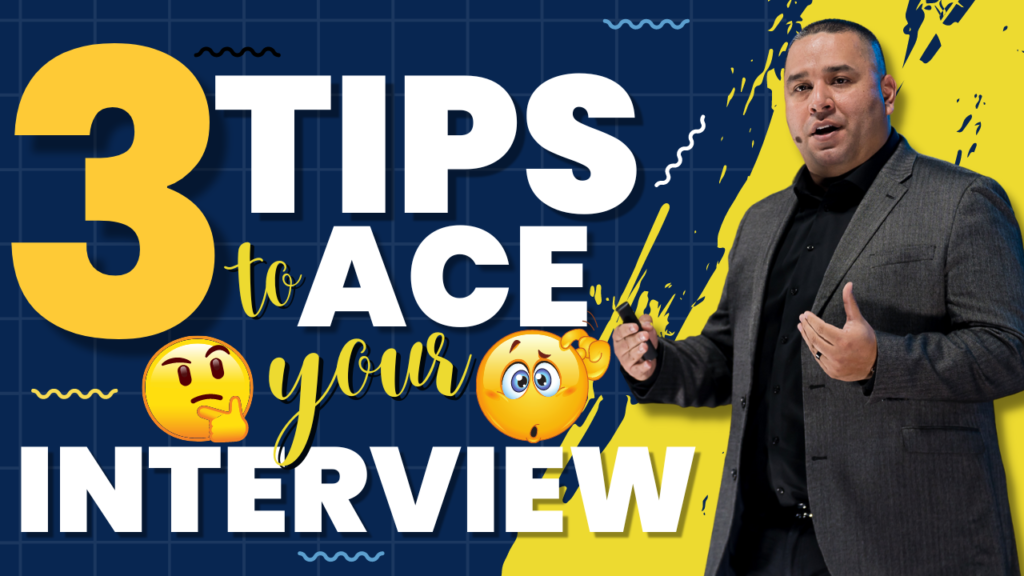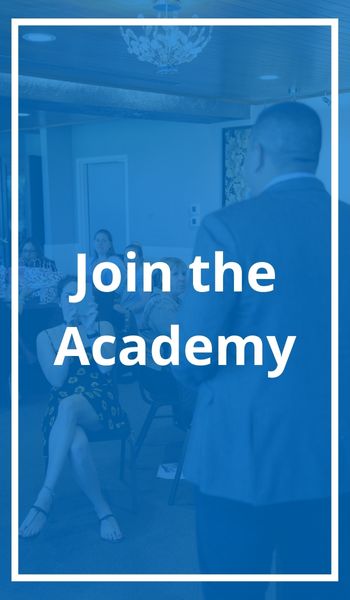There are currently over 2 million open sales positions in the US today, and companies are reporting that 25% of their salesforce is turning over every quarter. Every 90 days, 25% of the people you have trained will leave your company. If you’re a B-to-B salesperson, the job market right now is in your favor – so if you’re not getting what you want from the company you’re at, it’s time to start looking for something new.
In order to land a sales job, you need to stand out from the other applicants in your interviews. Most people make the mistake of thinking their resume is enough to get them hired – this isn’t usually the case. So today, I’m going to share with you three strategies on how to pass your interview and land that job offer!
Tip #1
Be prepared for the questions that might be asked, and more importantly, know how to tell stories that answer those questions. Sales interviewers are looking for candidates who can entertain them with their responses and leave them wanting to learn more about the person they’re interviewing. So if you go online and research common interview questions, don’t worry so much about the specific question being asked – focus on telling a story that will engage the interviewer instead.
STAR Methodology
The Star Methodology is the way to answer questions in an interview. It involves telling a story that is complete, intriguing, and engaging. So when you are asked, tell the STAR: the situation, task, the action you took, and the results. When interviewing people, I always go back to who told me a better story. Here’s an example:
Q: “Can you tell me about the biggest victory you had in your previous sales job?”
Instead of saying, “yes, I did this. I closed this account for a million dollars. It took me nine months,” answer with this format instead:
“Here’s the situation. I was working with XYZ Company. I’d been working with them for almost a year on consistent visits, consistent follow-ups, and trying to time up my proposal with the expiration of their current contract. The task at hand was to get them to sign on board. The goal was to work with me at the start of the new year. I laid out the plan with my manager. We put the strategy in place so we acknowledge we had to do something different. So here’s the action we took. We decided that we were going to implement a monthly drop-in strategy. The monthly drop-in strategy was, ‘hey, I’m sharing this story with you in person about somebody that you know, that’s had success using our service.’ So I made these monthly drops. And the action we really did was I brought in some Starbucks. I got in front of the decision maker, and it was a very casual three to five-minute conversation that we implemented in person on a monthly basis. And here’s the deal. As this person started to get to know me more, I wasn’t going to sell him something. I was just simply stopping him to share something of value. The end result is this at about month eight of these monthly drops, I made the joke to him. I said, hey, we should probably set up a time so we can talk about your company, so I can tell your amazing story to your colleagues about working with us. As a result, he signed the biggest contract of my year.”
Tip #2
The interviewer is looking for someone who can sell themselves. If you can’t sell yourself to the interviewer, then you won’t be able to sell yourself to their customers. We, interviewers, are looking for someone with emotional intelligence, who can change their tone and voice as needed, and ask questions that show an understanding of what the interviewer wants.
You see, selling yourself in an interview really boils down to one thing: it’s how you ask questions as the interviewee. Every interviewer in the world is going to ask, “do you have any questions for me?” And at that point as an applicant, that is your time to shine and sell yourself.
Tip #3
Ask “Will you hire me” in a different way. And avoid directly asking “is there any reason you won’t call me back?” Rephrase that instead with these two remarkable questions:
“how do you feel our time went today?” and “Is there anything additional you need to hear from me to ensure I’m on that shortlist of people you call back next week?”
Acing the next round of interviews
The next round is an interview with the hiring manager, VP, the president of the company, or a board of people. And in all my years of interviewing people, this is the best way to close a group interview.
Thank the interviewers for their time. Then you look at the most senior person that you’re interviewing. Let’s say it’s the president of the company named John. And the hiring manager is Steve. You say,
“John, I appreciate our time together. May I ask you one last question? When I leave here, what feedback are you going to share with Steve about our interview today?”
This shows a heightened level of courage, which is what we need in sales. This shows you’re not afraid to hear a rejection. Whatever they tell you, be a salesperson’s answer. Handle objections and close again. And the second time you close, ask,
“are you going to give the endorsement to bring me to your company to our hiring manager?”
And when that moves on, turn to Steve and say, “Steve. Thank you for our time together today. Steve, is there any reason the feedback that John is giving you today wouldn’t move me forward in this process?
If you’re interviewing with an experienced manager, this is not their first trip to the rodeo. So if you don’t get the response you want, that’s okay. Don’t get off the table without asking each person twice to endorse you from bringing you on board. And when you have a two-person interview, go to the senior person first, because it shows you have the courage to take rejection.
The next steps
Hiring salespeople is just as challenging, right?
We do tons of work within the Catapulting Commissions Academy for any salesperson! If you’re an end user, meaning you generate sales in a service-based industry or you’re a sales entrepreneur, we do tons of work in the academy on how to excel in sales for you. And we do a small portion of how to train you for your sales interview.
If you’re a company and you’re looking to hire people, check out our podcast episode with Nigel Green.
He has an amazing course that helps outline exactly what you need to do on hiring great, talented salespeople. Click here to register!







